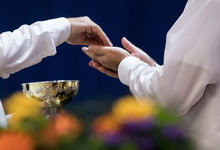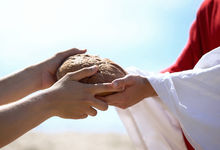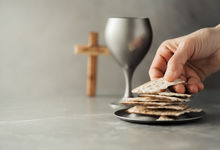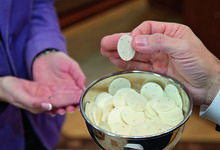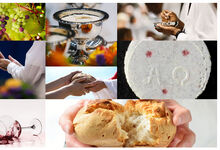The sacraments (35): Who is allowed to the table and where?
Taking a seat at the Lord’s table—that can involve a lot of hurdles: all Christian churches attach conditions to participation in Holy Communion. Anyone who decides to visit another denomination can easily get tangled up.

Hurdle number 1 has to do with water: in nearly all churches, only those who have been duly baptised are invited to the celebration of the Lord’s Supper or the Eucharist. In some evangelical communities, having been baptised as a child does not suffice. One has to have been baptised as a mature adult. Only in a few denominations—such as the Methodist Church, for example—is the Lord’s Supper open to the unbaptised. But even here there is a condition for participation: the communicant must believe in Jesus Christ.
Hurdle number 2 is age: in ancient times, it was a matter of course for infants to receive Holy Communion—and that within minutes of their baptism. The Orthodox and Eastern Catholic Churches have maintained this tradition to the present day.
Since the twelfth century, children have only been permitted to come to the table of the Lord after reaching the age of reason in the Roman Catholic Church. The age limit was originally set at around seven years, then raised for some time to between the ages of ten and fourteen, but it has since returned to its original level. The premiere is solemnly celebrated as First Communion.
In the churches of the Reformation, participation in Holy Communion used to have to wait until confirmation between the age of twelve and sixteen. In the meantime, it has largely become the norm to admit children to the Lord’s Supper. This has been customary in the Reformed churches for decades. Baptised children are also permitted to participate in Holy Communion in the New Apostolic Church.
Hurdle number 3 is the denomination to which one belongs—and this is where things get quite complicated. This is because the rules of two different churches come to bear at the same time, namely that of the dispensing clergy and that of the communicant.
The strictest about the matter are the Orthodox Churches, and that is because they define church as a Eucharistic community. Those who participate in their divine liturgy also join their church in the process. Exceptions are made for Catholics, on request, if they have no other options available to them. All other Christians are nevertheless permitted to share in the antidoron—the blessed, but not consecrated, pieces cut from the same bread that is used for the Eucharist.
Catholic Churches show Orthodox Christians the same hospitality as the Orthodox Churches show Catholic Christians. Members of other denominations are only allowed to participate when in danger of death or in other serious emergencies, but only if they are unable to visit a community of their own denomination and if they profess belief in the validity of the Catholic ministry and sacrament beforehand. Catholics are forbidden to participate in the communion celebrations of other denominations.
Lutheran Churches of a very traditional character take a similarly strict view. Most Protestant Churches, however, maintain a practice of reciprocal hospitality. All Christians who are also admitted to the Lord’s Supper in their own churches are invited to join. Participation in the communion celebrations of other denominations is not recommended, but these churches do not consider themselves justified in forbidding believers to do so.
In the New Apostolic Church, all Christians who have been baptised with water in the name of the triune God are invited to Holy Communion as guests. Its own members can certainly participate in communion celebrations elsewhere, however, they are admonished to remember that long-term participation in the communion celebrations of other churches is basically tantamount to professing their doctrine.
And then there is still hurdle number 4: namely personal prerequisites: for example, the Orthodox churches require a confession beforehand, as well as abstinence from food and drink as of midnight that day. The Roman Catholic Church advocates a similar practice, namely the Eucharistic Fast, which requires the participant to abstain from food or drink (other than water) for at least an hour before the Eucharist. Those who consciously live in a condition of grave sinfulness are barred from access to Holy Communion. The Catholic Church includes divorced individuals who have been remarried (to another partner) in this category, for example.
The New Apostolic Church was no stranger to such restrictions in times past either. For example, believers living together in partnership without a marriage licence or in a homosexual relationship were barred from participating in Holy Communion. These restrictions were abolished by Chief Apostle Hans Urwyler in 1986, however. Since then, the principle of personal responsibility has been in effect in the New Apostolic Church.
Photo: SFIO CRACHO - stock.adobe.com
Article info
Author:
Date:
Keywords:
Andreas Rother
01.06.2021
sacraments,
Holy Baptism,
Holy Communion,
Doctrinal statements,
Denominations



